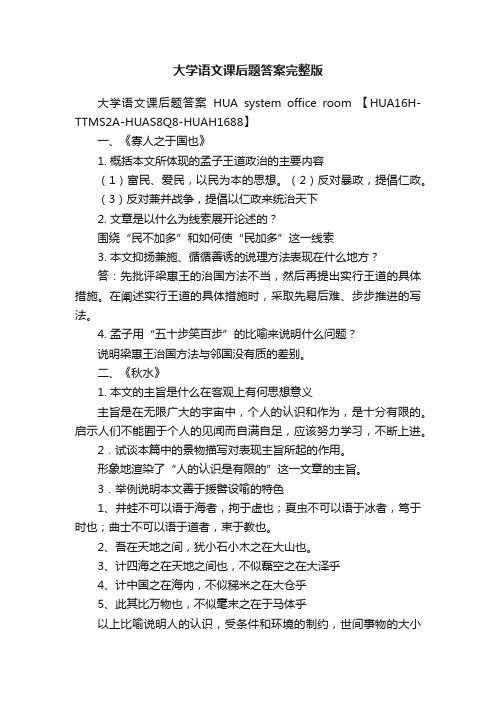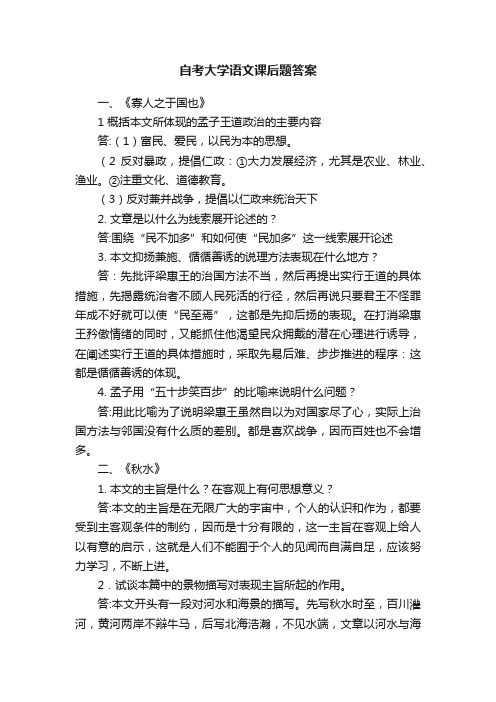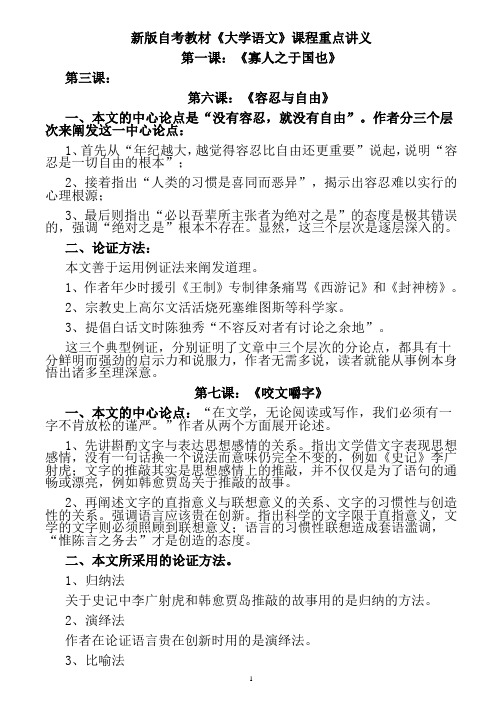大学语文教案10如何避免愚蠢的见识
罗素 避免愚蠢的错误

How to Avoid Foolish OpinionsAfter Bertrand RussellTo avoid the various foolish opinions to which mankind are prone, no superhuman genius is required. A few simple rules will keep you, not from all error, but from silly error.避免错误需要规则。
规则很简单。
他们至少可以让你避免愚蠢的错误。
If the matter is one that can be settled by observation, make the observation yourself. Aristotle could have avoided the mistake of thinking that women have fewer teeth than men, by the simple device of asking Mrs. Aristotle to keep hermouth open while he counted. He did not do so because he thought he knew. Thinking that you know when in fact you don’t is a fatal mistake, to which we are all prone. I believe myself that hedgehogs eat black beetles, because I have been told that they do; but if I were writing a book on the habits of hedgehogs, I should not commit myself until I had seen one enjoying this unappetizing diet. Aristotle, however, was less cautious. Ancient and medieval authors knew all about unicorns and salamanders; not one of them thought it necessary to avoid dogmatic statements about them because he had never seen one of themMany matters, however are less easily brought to the test of experience. If, like most of mankind, you have passionate convictions on many such matters, there are ways in which you can make yourself aware of your own bias. If an opinion contrary to your own makes you angry, that is a sign that you are subconsciously aware of having no good reason for thinking as you do. If someone maintains that two and two are five, or that Iceland is on the equator, you feel pity rather than anger, unless you know so little of arithmetic or geography that his opinion shakes your own contrary conviction. The most savage controversies are those about matters as to which there no good evidence either way. Persecution is used in theology, not in arithmetic, because in arithmetic there is knowledge, but in theology there is onlyopinion. So whenever you find yourself getting angry about a difference of opinion, be on your guard; you will probably find, on examination, that your belief is going beyond what the evidence warrants.A good way of riding yourself of certain kinds of dogmatism is to become aware of opinions held in social circles different from your own. When I was young, I lived much outside my own country-in France, Germany, Italy, and the United States. I found this very profitable in diminishing the intensity of insular prejudice. If you cannot travel, seek out people with whom you disagree, and read a newspaper belonging to a party that is not yours. If the people and the newspaper seem mad, perverse, and wicked, remind yourself that you seem so to them. In this opinion both parties may be right, but they cannot both be wrong. This reflection should generate acertain caution.For those who have enough psychological imagination, it is a good plan to imagine an argument with a person having a different bias. This has one advantage, and only one, as compared with actual conversation with opponents; this one advantage is that the method is not subject to the same limitations of time or space. Mahatma Gandhi deplores railways and steamboats and machinery; he would like to undo thewhole of the industrial revolution. You may never have an opportunity of actually meeting any one who holds this opinion, because in Western countries most people take the advantage of modern technique for granted. But if you want to make sure that you are right in agreeing with the prevailing opinion, you will find it a good plan to test the arguments that occur to you by considering what Gandhi might say in refutation of them. I have sometimes been led actually to change my mind as a result of this kind of imaginary dialogue, and, short of this, I have frequently found myself growing less dogmatic and cocksure through realizing the possible reasonableness of a hypothetical opponent.Be very wary of opinions that flatter your self-esteem. Both men and women, nine times out of ten, are firmly convinced of the superior excellence of their own sex. There is abundant evidence on both sides. If you are a man, you can point out that most poets and mean of science are male; if you are a woman, you can retort that so are most criminals. The question is inherently insoluble, but self-esteem conceals this from most people. We are all, whatever part of the world we come from, persuaded that our own nation is superior to all other. Seeing that each nation has its characteristic merits and demerits, we adjust our standard of values so as to make out that the merits possessed by our nation are the rally important ones, while its demerits are comparatively trivial. Here, again, the rational man will admit that the question is one to which there is no demonstrably right answer. It is more difficult to deal with the self-esteem of man as man, because we cannot argue out the matter with some nonhuman mind. The only way I know of dealing with this general human conceit is to remind ourselves that man is a brief episode in the life of a small planet in a little corner of the universe, and that for aught we know, other parts of the cosmos may contain beings as superior to ourselves as we are to jellyfish.怀有各种各样愚蠢的见识乃是人类的通病。
大学语文课后题答案完整版

大学语文课后题答案完整版大学语文课后题答案HUA system office room 【HUA16H-TTMS2A-HUAS8Q8-HUAH1688】一、《寡人之于国也》1. 概括本文所体现的孟子王道政治的主要内容(1)富民、爱民,以民为本的思想。
(2)反对暴政,提倡仁政。
(3)反对兼并战争,提倡以仁政来统治天下2. 文章是以什么为线索展开论述的?围绕“民不加多”和如何使“民加多”这一线索3. 本文抑扬兼施、循循善诱的说理方法表现在什么地方?答:先批评梁惠王的治国方法不当,然后再提出实行王道的具体措施。
在阐述实行王道的具体措施时,采取先易后难、步步推进的写法。
4. 孟子用“五十步笑百步”的比喻来说明什么问题?说明梁惠王治国方法与邻国没有质的差别。
二、《秋水》1. 本文的主旨是什么在客观上有何思想意义主旨是在无限广大的宇宙中,个人的认识和作为,是十分有限的。
启示人们不能囿于个人的见闻而自满自足,应该努力学习,不断上进。
2.试谈本篇中的景物描写对表现主旨所起的作用。
形象地渲染了“人的认识是有限的”这一文章的主旨。
3.举例说明本文善于援譬设喻的特色1、井蛙不可以语于海者,拘于虚也;夏虫不可以语于冰者,笃于时也;曲士不可以语于道者,束于教也。
2、吾在天地之间,犹小石小木之在大山也。
3、计四海之在天地之间也,不似磊空之在大泽乎4、计中国之在海内,不似稊米之在大仓乎5、此其比万物也,不似毫末之在于马体乎以上比喻说明人的认识,受条件和环境的制约,世间事物的大小都是相对的,人的认识是十分有限的。
这些比喻以一个个具体生动的形象,把深奥而抽象地哲理表达的浅显易懂。
4.试分析本文的论证方法。
本文在说理方面有以下特色:(1)论证结构上,本文经过由小到大,再由大到小的逐层推进,这种逐层推进的论证结构很有说服力。
(2)论证方法上,本文采用了寓言的形式,形象生动,又以类比法为主,用大量的比喻,生动形象地论证中心主旨。
(3)语言修辞上,作者大量运用排比,反诘的修辞手法,造成了文章滔滔莽莽的气势,增强了说理的力量。
自考大学语文课后题答案

自考大学语文课后题答案一、《寡人之于国也》1 概括本文所体现的孟子王道政治的主要内容答:(1)富民、爱民,以民为本的思想。
(2 反对暴政,提倡仁政:①大力发展经济,尤其是农业、林业、渔业。
②注重文化、道德教育。
(3)反对兼并战争,提倡以仁政来统治天下2. 文章是以什么为线索展开论述的?答:围绕“民不加多”和如何使“民加多”这一线索展开论述3. 本文抑扬兼施、循循善诱的说理方法表现在什么地方?答:先批评梁惠王的治国方法不当,然后再提出实行王道的具体措施,先揭露统治者不顾人民死活的行径,然后再说只要君王不怪罪年成不好就可以使“民至焉”,这都是先抑后扬的表现。
在打消梁惠王矜傲情绪的同时,又能抓住他渴望民众拥戴的潜在心理进行诱导,在阐述实行王道的具体措施时,采取先易后难、步步推进的程序:这都是循循善诱的体现。
4. 孟子用“五十步笑百步”的比喻来说明什么问题?答:用此比喻为了说明梁惠王虽然自以为对国家尽了心,实际上治国方法与邻国没有什么质的差别。
都是喜欢战争,因而百姓也不会增多。
二、《秋水》1. 本文的主旨是什么?在客观上有何思想意义?答:本文的主旨是在无限广大的宇宙中,个人的认识和作为,都要受到主客观条件的制约,因而是十分有限的,这一主旨在客观上给人以有意的启示,这就是人们不能囿于个人的见闻而自满自足,应该努力学习,不断上进。
2.试谈本篇中的景物描写对表现主旨所起的作用。
答:本文开头有一段对河水和海景的描写。
先写秋水时至,百川灌河,黄河两岸不辩牛马,后写北海浩瀚,不见水端,文章以河水与海水景象的大小对比,来衬托河伯与海若两种不同的认识境界,形象地渲染了“人的认识是有限的”这一文章的主旨。
3.举例说明本文善于援譬设喻的特色答:援譬设喻使哲理具体化、形象化。
庄子散文善于援譬设喻来表达抽象的哲理,而且比喻往往连类而及,层见迭出,令人目不暇接。
本文同样如此,比喻句有:(1) 井蛙不可以语于海者,拘于虚也;夏虫不可以语于冰者,笃于时也;曲士不可以语于道者,束于教也。
高中作文:如何避免愚蠢的观点 How to avoid stupid opinions

作文一How to avoid stupid opinionsIn our daily lives, we are constantly exposed to a plethora of information and viewpoints. However, not all of these are well-founded or rational. To avoid forming and expressing stupid opinions, it is essential to cultivate certain skills and mindsets.One of the primary ways to prevent such opinions is through extensive research and learning. Before forming an opinion on a subject, it is crucial to gather information from multiple reliable sources. This helps in obtaining a comprehensive understanding of the topic, including different perspectives and potential counterarguments. For instance, if one wants to have an opinion on a political issue, reading articles from various newspapers, research papers, and listening to experts' discussions can provide a more balanced view.Critical thinking is another key factor. This involves questioning the information presented, analyzing its validity and reliability, and looking for logical fallacies. It is important to not accept everything at face value but to dig deeper and think independently. For example, when encountering a viral social media post claiming a certain fact, instead of immediately sharing or believing it, one should check the source, look for evidence, and consider the context.Maintaining an open mind is also vital. Acknowledging that one's initial understanding may be limited or incorrect allows for the possibility of growth and change. Being receptive to new ideas and different viewpoints helps in avoiding stubborn and narrow-minded opinions. It is possible to have a strong belief while still being willing to listen and consider opposing arguments.Avoiding hasty generalizations is equally important. Just because a few instances or examples support a particular view does not mean it is universally true. One should look at a larger sample size and consider various factors before coming to a conclusion.In conclusion, avoiding stupid opinions requires a commitment to continuous learning, critical thinking, an open mind, and careful consideration of the available evidence. By doing so, we can form more informed, rational, and respectful opinions that contribute positively to discussions and decision-making.作文二How to avoid stupid opinionsForming and expressing opinions is an integral part of human communication and interaction. However, it is crucial to ensure that these opinions are well-considered and not simply based on ignorance or misinformation. Here are some ways to avoid stupid opinions.First and foremost, it is essential to cultivate a habit ofself-awareness. Recognize your own biases and limitations. We all have preconceived notions and preferences that can cloud our judgment. By being conscious of these, we can strive to approach a topic more objectively.Secondly, actively seek diverse perspectives. Engage in conversations with people from different backgrounds, cultures, and experiences. This broadens our understanding and helps us see beyond our own narrow viewpoints. For example, if discussing environmental policies, talk to experts, activists, and ordinary citizens with varying stances to gain a more comprehensive view.Another important aspect is to fact-check and verify information. In the age of the internet, it is easy to come across false or misleading data. Before forming an opinion based on something you've read or heard, take the time to cross-reference and ensure its accuracy.Also, be willing to admit when you are wrong. If new evidence or a better argument emerges that contradicts your initial opinion, have the humility to change your stance. This shows intellectual growth and a commitment to truth rather than stubbornly holding onto a faulty opinion.Furthermore, practice empathy. Try to understand the feelings and circumstances of others when forming an opinion. This helps in avoiding insensitive or ill-informed remarks that may be considered stupid.In summary, avoiding stupid opinions requires a combination of self-reflection, open-mindedness, diligent research, and a willingness to evolve one's thinking. By following these steps, we can contribute more positively and intelligently to discussions and decision-making processes.作文三How to avoid stupid opinionsIn a world filled with information and diverse viewpoints, it can be challenging to avoid forming and expressing stupid opinions. However, with the right approach and mindset, it is possible to navigate through this maze of ideas and come up with more sensible and informed perspectives.One effective way is to constantly educate oneself. This involves reading widely across various subjects, attending seminars or webinars, and taking courses to enhance one's knowledge and understanding. Awell-informed person is less likely to hold naive or ill-informed opinions. For instance, if you want to have an opinion on a complex topic like artificial intelligence, studying the basics of computer science, ethics, and the social impact of the technology will enable you to form a more intelligent view.Listening actively is another crucial skill. When others are sharing their opinions, truly listen without immediately jumping to conclusions or dismissing them. By doing so, you may discover aspects you hadn't considered before and avoid the trap of forming a one-sided opinion.Avoiding emotional reactivity is also important. Strong emotions can often lead to hasty and ill-considered opinions. Instead, take a moment to calm down and analyze the situation objectively before expressing your viewpoint.It is also beneficial to challenge your own assumptions and beliefs regularly. Question why you hold a particular opinion and whether there is sufficient evidence to support it. If not, be open to reevaluating and modifying your stance.In addition, when in doubt, it is better to remain silent or admit that you need more time to form an opinion. It is more respectable to say "I don't know enough to have an opinion" than to spout a poorly thought-out one.In conclusion, avoiding stupid opinions is an ongoing process that requires continuous learning, open-mindedness, self-reflection, and the ability to control one's emotions and reactions. By adopting these practices, we can contribute more meaningfully to conversations and make more informed decisions.作文四How to avoid stupid opinionsIn the realm of human thought and expression, the ability to avoid stupid opinions is a valuable skill that can lead to more productive discussions and better decision-making.To start with, it is essential to develop a sense of intellectual humility. Understand that no one knows everything and that there is always more to learn. Acknowledge that your current knowledge may be limited and that there could be alternative perspectives that are equally valid or even more accurate.Another important aspect is to base your opinions on reliable evidence and facts. Do not rely solely on anecdotes or personal experiences, as these can be biased and not representative of the larger picture. Instead, look for data, research studies, and expert opinions to support your viewpoints. For example, if forming an opinion on a medical issue, consult scientific research and professional medical advice rather than relying on rumors or unsubstantiated claims.Furthermore, be willing to consider counterarguments. When you have an opinion, actively seek out opposing viewpoints and try to understand them. This not only helps you refine your own opinion but also shows that you are open-minded and willing to engage in meaningful dialogue.Avoiding groupthink is also crucial. Do not simply adopt the opinions of the majority or a particular group without critical examination. Have the courage to think independently and form your own conclusions based on rational analysis.In addition, take the time to reflect and think deeply about a topic before expressing an opinion. Rushing to judgment often leads toill-formed and potentially stupid opinions.In summary, avoiding stupid opinions requires a commitment to intellectual growth, evidence-based thinking, open-mindedness, and reflection. By cultivating these qualities, we can contribute more positively to the exchange of ideas and the pursuit of truth.作文五How to avoid stupid opinionsIn the complex landscape of human discourse, the avoidance of stupid opinions is not only a matter of intellectual integrity but also a key to fostering meaningful communication and understanding.One of the fundamental steps is to cultivate a spirit of curiosity. Instead of immediately jumping to conclusions, ask questions and seek to understand the nuances and underlying factors of a subject. This helps in uncovering hidden aspects that might otherwise lead to a simplistic or inaccurate opinion. For instance, when faced with a social issue, rather than reacting based on initial impressions, inquire about the root causes, historical context, and potential solutions.Engaging in diverse and respectful conversations is another valuable approach. Interacting with people of different ages, backgrounds, and ideologies exposes us to a wide range of perspectives. This enriches our understanding and makes us less prone to forming opinions based on limited or one-sided information.It is also important to be critical of the sources of information we consume. In the digital age, where misinformation spreads rapidly, it is essential to verify the credibility and reliability of the news, articles, and data we rely on. Relying on trustworthy and well-researched sources reduces the risk of forming opinions based on false or misleading information.Moreover, practice self-discipline in expressing opinions. Before sharing your thoughts, consider whether they are well-formed, supported by evidence, and respectful of others' viewpoints. If not, it might be best to hold back and further refine your perspective.Finally, recognize that our opinions are not set in stone and should evolve as we acquire new knowledge and experiences. Be open to changing your opinion when presented with compelling evidence or a more compelling argument.In conclusion, avoiding stupid opinions is an ongoing process that involves curiosity, diverse conversations, critical evaluation of information, self-discipline, and a willingness to adapt. By doing so, we can contribute to more intelligent and productive discussions and enhance our ability to make informed decisions.。
中学生优秀作文精选:如何避免愚蠢的见识

如何避免愚蠢的见识怀有各种各样愚蠢的见识乃是人类的通病。
要想避免这种通病,并不需要超人的天才。
下面提供的几项简单原则,虽然不能保证你不犯任何错误,却可以保证你避免一些可笑的错误。
如果一个问题但凭观察就可以解决的话,就请您亲自观察一番。
亚里士多德误以为妇女牙齿的数目比男人少。
这种错误,他本来是可以避免的,而且办法很简单。
他只消请他的夫人把嘴张开亲自数一数就行了。
但他却没有这样做,原因是他自以为是。
自以为知道而实际上自己并不知道;这是我们人人都容易犯的一种致命错误。
我自己就以为刺猬好吃油虫,理由无非是我听人这么讲过;但是如果我真的要动手动脚写一部介绍刺猬习性的着作,我就不应该妄下断语,除非我亲自看见一只刺猬享用这种并不可口的美餐。
然而亚里士多德却不够谨慎。
古代和中古时代的着作家谈起麒麟和火蛇来头头是道;但是他们当中的谁也没有觉得,既然如此自己从未见过任何麒麟和火蛇,那就必须避免武断。
许多事情不那么容易用经验加以检验。
如果你像大多数人一样在许多这类事情上有颇为激烈的主张,也有一些办法可以帮你认识自己的偏见。
如果你一听到一种与你相左的意见就发怒,这就表明,你已经下意识地感觉到你那种看法没有充分理由。
如果某个人硬要说2加2等于5,或者说冰岛位于赤道,你就只会感到怜悯而不是愤怒,除非你自己对数学和地理也是这样无知,因而他的看法竟然动摇了你的相反的见解。
最激烈的争论是关于双方都提不出充分证据的那些问题的争论。
迫害见于神学领域而不见于数学领域,因为数学问题是知识问题,而神学问题则仅是见解问题。
所以,不论什么时候,只要发现自己对不同的意见发起火来,你就要小心,因为一经检查,你大概就会发现,你的信念并没有充分证据。
摆脱某些武断看法的一种好办法就是设法了解一下与你所在的社会圈子不同的人们所持有的种种看法。
我觉得这对削弱狭隘偏见的强烈程度很有好处。
如果你无法外出旅行,也要设法和一些持不同见解的人们有些交往,或者阅读一种和你政见不同的报纸。
自学考试04729大学语文重点笔记

自考《大学语文》课程重点笔记第一课:《寡人之于国也》1、抑扬兼施、循循善诱的特色。
孟子的文章向来十分长于说理。
这篇文章就充分体现了其抑扬兼施、循循善诱的特色。
首先孟子通过“五十步笑百步”的比喻批评梁惠王的治国方法不当,然后再提出实行王道的具体措施;先以批评的态度揭露统治者不顾人民死活的行径,然后马上又说只要君王不怪罪年成不好就可以使“民至焉”:这都是先抑后扬,先使梁惠王认识自己的错误,同时又给予其希望,让梁惠王明白他的错误其实是可以改正的,只要改正了就可以解决“民不加多”的困惑。
在打消梁惠王矜傲情绪的同时,又能抓住他渴望民众拥戴的潜在心理进行诱导;在阐述实行王道的具体措施时,采取先易后难、步步推进的程序:这都是循循善诱的体现。
让梁惠王认识到,只要实行王道,那么就有称王天下的可能性。
2、比喻的使用。
这篇文章中孟子用了两个比喻来增加自己的观点的说服力。
(1)用逃跑者“以五十步笑百步”的比喻,来说明梁惠王的治国方法与邻国没有什么质的差别。
(2)用拿刀杀了人却说“非我也,兵也”作比喻,来揭露统治者把“涂有饿莩”归罪于年成不好的观点。
孟子通过这两个比喻生动形象的佐证自己的论点,使单纯的说理变得妙趣横生,收到了把抽象的道理说得非常形象、生动而深刻的效果。
3、许多排比句的运用,也大大助长了文章的雄辩气势。
孟子在这篇文章量的运用排比句式,或递进、或类比,使文章气势雄浑,使自己的论述的观点更加具有说服力。
(1)不违农时,谷不可胜食也;数罟不入洿池,鱼鳖不可胜食也;斧斤以时入山林,材木不可胜用也。
谷与鱼鳖不可胜食,材木不可胜用,是使民养生丧死无憾也。
(2)五亩之宅,树之以桑,五十者可以衣帛矣;鸡豚狗彘之畜,无失其时,七十者可以食肉矣;百亩之田,勿夺其时,数口之家,可以无饥矣;谨庠序之教,申之以孝悌之义,颁白者不负戴于道路矣。
(3)狗彘食人食而不知检,涂有饿莩而不知发。
(4)人死,则曰,‘非我也,岁也’。
是何异于刺人而杀之,曰,‘非我也,兵也。
新版自考教材《大学语文》课程重点讲义

新版自考教材《大学语文》课程重点讲义第一课:《寡人之于国也》第三课:第六课:《容忍与自由》一、本文的中心论点是“没有容忍,就没有自由”。
作者分三个层次来阐发这一中心论点:1、首先从“年纪越大,越觉得容忍比自由还更重要”说起,说明“容忍是一切自由的根本”;2、接着指出“人类的习惯是喜同而恶异”,揭示出容忍难以实行的心理根源;3、最后则指出“必以吾辈所主张者为绝对之是”的态度是极其错误的,强调“绝对之是”根本不存在。
显然,这三个层次是逐层深入的。
二、论证方法:本文善于运用例证法来阐发道理。
1、作者年少时援引《王制》专制律条痛骂《西游记》和《封神榜》。
2、宗教史上高尔文活活烧死塞维图斯等科学家。
3、提倡白话文时陈独秀“不容反对者有讨论之余地”。
这三个典型例证,分别证明了文章中三个层次的分论点,都具有十分鲜明而强劲的启示力和说服力,作者无需多说,读者就能从事例本身悟出诸多至理深意。
第七课:《咬文嚼字》一、本文的中心论点:“在文学,无论阅读或写作,我们必须有一字不肯放松的谨严。
”作者从两个方面展开论述。
1、先讲斟酌文字与表达思想感情的关系。
指出文学借文字表现思想感情,没有一句话换一个说法而意味仍完全不变的,例如《史记》李广射虎;文字的推敲其实是思想感情上的推敲,并不仅仅是为了语句的通畅或漂亮,例如韩愈贾岛关于推敲的故事。
2、再阐述文字的直指意义与联想意义的关系、文字的习惯性与创造性的关系。
强调语言应该贵在创新。
指出科学的文字限于直指意义,文学的文字则必须照顾到联想意义;语言的习惯性联想造成套语滥调,“惟陈言之务去”才是创造的态度。
二、本文所采用的论证方法。
1、归纳法关于史记中李广射虎和韩愈贾岛推敲的故事用的是归纳的方法。
2、演绎法作者在论证语言贵在创新时用的是演绎法。
3、比喻法为了说明文字的直指意义与联想意义作者分别把它们比喻为月轮、月晕。
更加形象直接,容易把握三、直指意义与联想意义的不同特点和作用。
1、直指的意义载在字典,有如月轮,明显而确实;联想的意义是文字在历史过程上所累积的种种关系,有如轮外圆晕,晕外霞光,其浓淡大小随人随时随地而各各不同,变化莫测。
如何防止思维误区教案

如何防止思维误区教案教案标题:如何防止思维误区教案目标:1. 帮助学生认识和理解思维误区的概念。
2. 提供学生防止思维误区的策略和技巧。
3. 通过实际案例和练习,培养学生自我纠正思维误区的能力。
教案步骤:引入阶段:1. 创设一个引人入胜的情境,例如一个有趣的故事或者一个引人思考的问题,以激发学生对思维误区的兴趣和好奇心。
2. 引导学生讨论思维误区的定义和常见表现,以帮助他们认识到思维误区对我们的思考和决策产生的负面影响。
讲解阶段:3. 介绍几种常见的思维误区,如偏见、刻板印象、过度一般化等,并解释它们的定义和特征。
4. 提供实际案例,让学生分析并识别出案例中存在的思维误区。
5. 解释思维误区对学习和生活的影响,以帮助学生意识到纠正思维误区的重要性。
实践阶段:6. 分组讨论:将学生分成小组,让他们共同探讨在不同情境下可能出现的思维误区,并提出相应的纠正策略。
7. 小组展示:每个小组选择一个常见的思维误区,并通过角色扮演、案例分析等方式展示出该误区,并提出纠正策略。
8. 练习:提供一些练习题,让学生运用所学的纠正策略,找出并纠正思维误区。
总结阶段:9. 总结课程内容,强调纠正思维误区的重要性和技巧。
10. 鼓励学生在日常生活中积极应用所学的纠正策略,以提高他们的思维质量和决策能力。
教案评估:1. 观察学生在小组讨论和展示中的参与程度和表现。
2. 评估学生在练习中运用纠正策略的能力和准确性。
3. 收集学生的反馈和意见,以了解他们对教学内容的理解和掌握程度。
教案拓展:1. 鼓励学生阅读相关的案例和研究,以加深对思维误区的理解。
2. 提供更多的练习和案例,让学生能够在不同情境下灵活运用纠正策略。
3. 引导学生进行小组或个人研究项目,探索思维误区在特定领域(如科学、历史、社会等)中的应用和影响。
教案资源:1. PowerPoint演示文稿,用于引入和讲解阶段。
2. 案例分析材料,用于实践阶段的小组讨论和展示。
- 1、下载文档前请自行甄别文档内容的完整性,平台不提供额外的编辑、内容补充、找答案等附加服务。
- 2、"仅部分预览"的文档,不可在线预览部分如存在完整性等问题,可反馈申请退款(可完整预览的文档不适用该条件!)。
- 3、如文档侵犯您的权益,请联系客服反馈,我们会尽快为您处理(人工客服工作时间:9:00-18:30)。
学校名称:南鄂专修学院 大学语文教案 任课教师:夏简保
40
教学目标:
1、 理解避免愚蠢见识的重要性,归纳避免愚蠢见识的途径。
2、 把握本文的行文风格,以及该表达风格与文章观点的有机统一。
3、 努力克服自己学习、生活中容易出现的“愚蠢见识”。
教学设想:[重点]理解避免愚蠢见识的重要性,归纳避免愚蠢见识的途径。
[难点]把握本文的行文风格,以及该表达风格与文章观点的有机统一。
[课时]一课时
第一课时
一、导入新课
在现实生活中,因偏见而起的纠纷到处可见,从国家、民族对立到科学人文争论,从政
党的派系相残到科研的门户偏见,从劳资矛盾到地区歧视,从商场搏杀到办公室兵法,从文
人相轻到夫妻龃龉等等。那么,如何避免呢? 我们中国有一句老话叫做“兼听则明”,如果你
要避免自己自以为是那么你就可以用“假想的论敌”来反驳自己。
二、讲授新课
1.关于作者
伯特兰•罗素(Bertrand Russell 1872—1970)罗素是二十世纪西方声誉最著、影响最大的哲学
家之一。他不只限于学术研究,从青年到老年始终热衷于社会运动。他的学术活动也远不限
于哲学,一生所写就的四十余本著作,广泛地涉及了哲学、数学、科学、伦理学、社会学、
教育、历史、宗教,以及政治等各个方面。
1950年,是诺贝尔文学奖设立五十周年纪念年,瑞典文学院选择了一个从未发表过一首
诗或一部文学作品的作家,通过把诺贝尔的信念等同于罗素的理性主义和自由主义,来表示
对阿尔弗雷德〃诺贝尔的纪念。
罗素是20世纪著名的思想家和社会活动家,并作为一个数学家闻名于世。他把他的非
专门化著作表述成适合于一般有思想、理解力强的读者,从而为他赢得了特殊的声望。
罗素很幽默。获得诺贝尔文学奖后,从没写过文学作品的罗素,竟开始写起小说来。第
一部小说1951年匿名发表,并悬赏猜测作者何人,结果无一人猜中,因为谁也不会相信,这
位年近80岁,负有盛名的哲学家还有写小说的雅兴。(汪剑钊《不可不读的罗素》,《上海教
育》2005年第12期)
2.结构层次
第一层:总述摆脱武断看法的一种方法是去设法了解周围人所持有的看法
第二层:设法了解周围人持有的看法的方法总的说就是见多识广
3.内容赏析
文章开首一句“怀有各种各样愚蠢的见识乃是人类的通病”,颇有惊天动地之感,突兀而
至,简洁干脆,顺理成章导入文章中心“如何避免愚蠢的见解”。
在开头的让人惊愕之后,文章却突然放慢了行文的节奏,有意识用自然质朴的平和腔调来论
证阐释,不动声色地提出“几项简单原则”,“保证你避免一些可笑的错误”,罗素是一个懂得
通过行文节奏控制读者心理感受的作者。
学校名称:南鄂专修学院 大学语文教案 任课教师:夏简保
41
个“简单原则”是“观察”,三个例子——亚里士多德、“我”和“古代作家”——来证明观
察力简单、容易培养却被人们忽视。
“摆脱某些武断看法的一种好办法就是设法了解一下与你所在的社会圈子不同的人们所
持有的种种看法。”
采用了归纳论证的方法
“不过也有许多事情不那么容易用经验加以检验”一句是很清晰的过渡句,转入第二个
不那么“容易”的“简单原则”。这个原则是什么呢?读者在此处是有好奇心的,但罗素并没
有依照读者的心理,简单地列出第二个“原则”,而是通过一个“如果”,巧妙地把“激烈”
的态度和“偏见”关联起来,通过态度“激烈”与否来检验自己的主张是否没有“偏见”。此
段内容并没有提出明确的“原则”,只是通过“二加二等于五”、“冰岛位于赤道”等很显而易
见的假设来说明“只要发现自己对不同的意见发起火来,你就要小心”的“原则”。
以下三段内容分别在本段的第一句开门见山地提出自己的“三条原则”:
(1)“摆脱某些武断看法的一种好办法就是设法了解一下与你所在的社会圈子不同的人
们所持有的种种看法”
(2)“对于这些人(富于心理想象力)来说,一个好办法便是设想一下自己在同一位怀
有不同偏见的人进行辩论”
(3)“对于那些容易助长你狂妄自大的意见尤宜提防”
这三条原则有一个共同点,就是都在谈如何对待别人的看法,先是“种种看法”,然后是
“怀有不同偏见”和“容易助长你狂妄自大”两种对立的看法,反复提醒要“避免愚蠢的见
解”,就必须放宽视野,不能“自以为是”。
结论:养成科学的认知态度,重观察和证据,避免想当然;听取不同意见,尤其是相反
意见,不自以为是;调整评价标准,换个角度看问题。只有这样才可以避免愚蠢的见解。
4.论证方法
采用了归纳论证的方法,又叫“事实论证”。它是用列举具体事例来论证一般结论的方法。
5.写作特点
(1)活泼的行文、多变的手法,使得文章走出了议论文常有的单调板滞的窠臼。
(2)在结构安排上,几个“原则”的呈示有清晰的逻辑关系: 先是“容易”的“观察”,
然后是能够感觉到的“态度”,再是对周围“有不同观点的人”、“有偏见的人”、“助长自己狂
妄自大的人”的不同了解,逐渐地从内到外把“自己”置身于一个更大的背景之中来思考,
层层推进,来解决“如何避免愚蠢的见解”。
(3)文章的语体基本上可以归类为演讲体。这种语体属于议论文大类,但它不是靠严密
的逻辑推理来得出结论,而往往是靠生动的实例论证自己的观点。这种语体一般句子简短,
语气流畅,用简洁的语言表达在某些问题上的真知灼见,思想和语言常有精彩闪光之处。
6. 避免愚蠢的见识的方法
(1)凡事不要抱绝对肯定的态度;
(2)不要试图隐瞒证据,因为证据最终会被暴露;
(3)不要害怕思考,因为思考总能让人有所补益;
(4)有人与你意见相左时,即使这些意见来自你的家人,也应该用争论去说服他们,而
学校名称:南鄂专修学院 大学语文教案 任课教师:夏简保
42
(5)不用盲目地崇拜任何权威,因为你总能找到相反的权威;
(6)不要用权力去压制你认为有害的意见,因为如果你采取压制,其实只说明你自己受
到了这些意见的压制;
(7)不要为自己持独特看法而感到害怕,因为我们现在所接受的常识都曾是独特看法;
(8)与其被动地同意别人的看法,不如理智地表示反对,因为如果你信自己的智慧,那
么你的异议正表明了更多的赞同;
(9)即使真相并不令人愉快,也一定要做到诚实,因为掩盖真相往往要费更大力气;
(10)不要嫉妒那些在蠢人的天堂里享受幸福的人,因为只有蠢人才以为那是幸福 。
三、总结全文
大家如何避免愚蠢的见识,我想有三个方面的非常重要的。
〈1〉科学的认知态度
对于一些凭观察就可以解决的问题我们可以用经验加以检验,不能用经验加以检验那么
就要有充分的证 据才可以下断言。
如果你一听到一种与你相左的意见就发怒,这就表明你已经下意识地感觉到你那种看法
没有充分理由。如果有人硬是说2+2=5,你对他就只会感到怜悯而不是愤怒。
〈2〉听取不同的意见
我们中国有一句老话叫做“兼听则明”,我相信这也不用我过多的解释。如果你要避免自
己自以为是那么你就可以用“假想的论敌”来反驳自己。
〈3〉客观世界的复杂性和不确定性。
有些问题本来就无法解决,而有些问题又没有明显的正确的答案,只有采取谦虚谨慎的
态度才能克服自高自大。
我们要树立“宇宙无限而人的认识十分有限”这一基本理念。你应该经常想在茫茫宇宙
中一个小小角落的一颗小小的星球的生命史上,人类仅仅是一个短短的插曲,而且说不定宇
宙中其他地方还有生物,他们优越于我们的程度不亚于我们优越于水母的程度。
不要仅仅为了驳倒对方来以羞辱别人的自尊心为乐,同样也应该勇于承认自己的错误见
识。
四、布置作业
1.联系自己的学习和生活,设计一个避免自己某些愚蠢见识的方案。
2.完成课后“思考与练习”。
